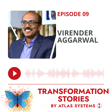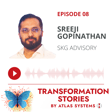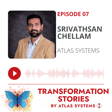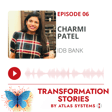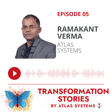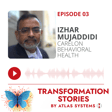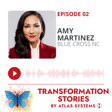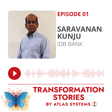Become a Creator today!Start creating today - Share your story with the world!
Start for free
00:00:00
00:00:01

#4: Rob Larsen
A hands-on leader and change-maker with 20 years of experience, Rob Larsen remains at the forefront of software-led innovation – in financial services and the larger enterprise world. In this all-new conversation with Atlas Systems, Larsen offers insights into finding the right pace for transformation, keeping stakeholders on board without promising too much, and rethinking his own personal approaches to getting things done and interacting with the world.
Tune in for this great conversation with an industry-leading author, tech champion, and all-around thought leader!
Recommended
Transcript
Introduction and Theme
00:00:00
Speaker
This is Transformation Stories, a podcast from Atlas Systems, exploring how companies are leaping into the future through deliberate change and innovation. In today's digital landscape, businesses face a choice to transform or risk falling behind.
00:00:18
Speaker
Here the insights of visionaries and changemakers were driving transformation across various industries and roles. They'll share their experiences, strategies, and the most potent opportunities for success. Join us as we uncover the secrets of transformation.
Rob Larson's Background
00:00:39
Speaker
Rob Larson is a leader and global team builder with over 20 years of hands-on experience in financial services and consulting. He's also an enterprise software architect with deep technical knowledge, shipping software on time and on budget for a variety of global Fortune 500 clients. Larson is the author of Beginning HTML and CSS for Wiley, The Uncertain Web for O-Riley, and Mastering SVG for PACT
00:01:09
Speaker
And he's the co-author of Professional jQuery and the HTML and CSS Workshop, both for PAC. An active member of the open source community, Larsen manages the H5BP organization and maintains HTML5 boilerplate, front-end developer interview questions, and related projects.
Career Insights and Projects
00:01:32
Speaker
All right, Rob, well, it's great to welcome you to Transformation Stories. And thank you so much for speaking to us today.
00:01:39
Speaker
It's my pleasure. I wonder if you could tell us a little about your history and your expertise, like what your interests are and what you're doing. Sure. I'm a software development architect, and I've been an active web developer, technical architect for 20 plus years now. In addition to my kind of day-to-day,
00:02:09
Speaker
written a bunch of books, traveled all around the world doing presentations and run the HTML5 boilerplate and front-end developer interview questions, GitHub repos, which are both over 50,000 stars. What were your books about? The web in meta form and in very detailed technical form.
00:02:36
Speaker
I wrote a book for O'Reilly called The Uncertain Web, which was about my kind of philosophy of doing web development and web development in a very chaotic environment with many devices, and your fridge can browse the web and some of those sort of things. And it was actually the topic of today was a transformative period. So it was right around the HTML5.
00:03:03
Speaker
era and things were changing very quickly. And it was just a philosophical guide on how to potentially approach that so that you could reach the largest possible audience. And then I've written four more purely technical books.
Passion for Web Development
00:03:20
Speaker
Beginning HTML and CSS, Mastering SVG, a jQuery book, 2009, when everything was jQuery.
00:03:29
Speaker
And I wrote part of the HTML and CSS workshop. So those were for PACT and Wiley. And what would you say is like your central passion or passions? What would you say are like the things that keep coming back that are your core pursuits? It's, I mean, the web at the end of the day, right? So I got into this because I loved the
00:03:56
Speaker
potential of the web, the power of the web to expand, for better or worse, to expand people's reach into the world and to connect people in ways that we couldn't have predicted 25 years ago. But on top of that, there's a drive to do all of that better.
00:04:20
Speaker
So part of that is very specifically like how it performs and how fast it is and how good it looks and how many different browsers you can view that content in. But then, as I've gotten deeper into my career and done more managing large projects, large open source projects, it's been about processes and making sure that you get from the idea
00:04:47
Speaker
of a feature or some functionality to actually shipping that code in the best possible way. Great outcomes, but also efficient, well-documented. When you said you were going to deliver it, how it was supposed to look and it does the things it's supposed to do.
Web's Transformative Eras
00:05:12
Speaker
Obviously, there's nothing
00:05:15
Speaker
we can think of more transformative than the web in terms of society and business. But even the web itself has undergone a lot of transformations. I mean, what are some of the big ones that you could think of or that you've really been a part of? So obviously, I wasn't around for the very birth of the web. But I came along not so far afterwards.
00:05:44
Speaker
and saw this kind of dark period for Core Web technologies where Flash was basically anything interesting you were going to do on the web, it was in Flash. It's kind of the early 2000s. And then Jesse James Garrett wrote an article in which he coined the term Ajax and kind of just kicked off this whirlwind of
00:06:14
Speaker
development and innovation and transformation about the way that we approach building interesting web applications and interfaces. And it immediately returned us to using core web standards and core web technologies and got away from, which a lot of people had wanted to, but we couldn't. We wanted to get away from using Flash, being stuck in a proprietary Adobe-owned
00:06:43
Speaker
Not that I have anything against Adobe, but it's like the web was supposed to be built on open standards. And it just, it took off overnight. And the interesting, I mean, there are many interesting things about it, but one of the interesting things for me is how ill prepared we were for doing very complicated application development in the browser. Debugging was difficult.
00:07:10
Speaker
The tools that we had, JavaScript frameworks, were in their infancy. There were some very powerful ones, but they were too big to use on the web. We hadn't really figured out how to package web applications efficiently. This is something that we take for granted now. Taking a megabyte of code and scrunching it down to 200k makes it a lot faster. And we just didn't do that.
00:07:40
Speaker
And so it was like everything that you had to do was new. Everything that you were trying to do was like, maybe somebody had figured it out six months ago, but often you were doing novel solutions for things because it just hadn't been done yet. So it was a very interesting time.
Challenges in Digital Transformation
00:08:00
Speaker
I mean, just in terms of digital transformation, do you feel like compared to 10, 20 years ago,
00:08:08
Speaker
that businesses and even society have gotten better at doing digital transformation or managing it? Or do you feel like it's still a huge disruption every time? I think that it depends on the environment or organization because there is a lot of
00:08:36
Speaker
So we're not rewriting it every time now. We shouldn't be. People, if you're moving from a data center to Azure or AWS, there are books and conferences and people you can call. And there's a lot of information about those sort of things. So modernizing the way that you compute should be easier than it would have been because you're not breaking the ground.
00:09:07
Speaker
But you also have to deal with the human side of that. You have to deal with buy-in. You have to deal with aversion to change or acceptance of change depending on the way that your organization is focused in that way. If people are ready for it and they're happy to plan and they're happy to use outside resources and
00:09:36
Speaker
research and all of those things, then it should be easier than it was 15 or 20 years ago. But it certainly isn't all the time. People can still mess it up because it is disruptive. Do you feel like there are any techniques or any things that companies and people can do to help really speed along that acceptance? Well, I think that
00:10:07
Speaker
you know, transparency in the planning process and really getting by and, you know, you can get people that'll say, oh, this is a great idea or whatever. And then they don't actually understand that it's, you know, not rebuilding the car.
00:10:28
Speaker
While it's driving, it's building another car alongside the car that you're driving and then jumping between the two cars. I mean, it is actually a little bit of a juggling act and there is some risk to doing it, whether or not it's an understood process. And you have to get people to not be squeamish about that. They need to realize it's going to be hard and there's some risk
00:10:56
Speaker
But once you get there, it becomes a planning, it becomes execution, it becomes things that if you break them down into small enough chunks, even if a couple don't go as smoothly as possible, the overall should be fine. But it really is, it's about making sure that the organization and people maybe writing, signing the checks understand what it actually means.
00:11:28
Speaker
Can you think about a transformation that went really well from that perspective and that was smooth that you were really, you know, had a front row seat on?
HTML5 Transition Impact
00:11:42
Speaker
Well, there's the meta one, the HTML5. So, okay. So we have the Ajax era, which was pure
00:11:54
Speaker
chaos. And there are a lot of people that just, they were not, they were squeamish about it. They didn't want to trust doing heavy web applications or like business critical applications as a JavaScript app. They just would laugh at you. They're like, no, we're going to do C sharp. And, you know, it's going to be in Java spring and it's going to be great. And it, you know, it was, those were very stable platforms, very successful.
00:12:24
Speaker
a lot of business was run on those sort of platforms. The Ajax era never petered out. It only got stronger. But the thing is, it was all kind of a series of ad hoc choices. So it was some person somewhere decides, oh, I need to solve this problem. And then suddenly they've made this gigantic open source library
00:12:51
Speaker
that sits at the center of the entire ecosystem, which is fine. I mean, that's how, you know, innovation happens in technologies, you have people with great ideas. But at the end of the day, a lot of that probably should be either standardized as, you know, part of a specification, you know, and then be part of the browser because browser vendors can optimize some of those things, right? And so the less that some
00:13:21
Speaker
random, very smart human is doing by themselves versus the browser is able to optimize certain processes. It's better to offload that stuff on the browser and specifications because it's hardened. And so there was this idea of revamping the HTML specification to make it a platform for modern web applications.
00:13:49
Speaker
There's a lot of crazy backstory about that, but, you know, eventually it turned into this, like, had a lot of momentum. Ian Hickson was in charge of the specification. It was a lot of, you know, great collaboration with web developers out in the wild. And, you know, around 2010, 2011, there was a lot of hype around HTML5. And suddenly, everyone realized that, you know, web applications and
00:14:18
Speaker
standards-based web applications were not only robust, they had a lot of real benefit. At the time, I was at Sapient Global Markets, which served a lot of financial services companies. My job was to talk to them about web applications and replacing their .NET MVC applications with HTML5 standards-based web applications
00:14:48
Speaker
or even desktop applications or anything, Excel spreadsheets, whatever you have floating around in these old banks and stuff like that, we were replacing with modern, really exciting, browser-delivered web applications. And it was like night and day between 2005 and 2011, how strong the adoption was. And it hasn't slowed down, obviously.
00:15:18
Speaker
Some momentum on the mobile app side, of course, with smartphones and whatever, but still, web application development is a strong paradigm in every business now. Just thinking about that and the other transformations you've been a part of, what do you think are the secrets of being a good transformational leader?
00:15:46
Speaker
What does it take to lead transformation successfully? I think it's being able to thread the needle between, obviously there are places to move fast and break stuff. That's why it's a phrase, but you can't all the time. It's actually not beneficial all the time. A lot of times you can move
00:16:16
Speaker
relatively quickly and break nothing. You can move slowly and break nothing, but really you're just breaking nothing, right? Because you inspire more confidence in the process if you're not breaking stuff. But you have to take risks. You have to insert risk into the process. And so it's making sure that you're moving as fast as you can to get where you need to go without stepping over that line.
00:16:46
Speaker
And it's, uh, and making sure that everyone's comfortable about that, you know, because you have to, you know, people think like, Oh, I can just go and wave my magic wand and all these things will change. And it's like, they might, but if you make some key decision maker or key stakeholder uncomfortable, it can shut the process down entirely, or it can slow it down for months because you have to get them back on your side.
00:17:12
Speaker
And it's much easier to keep them on your side than it is to lose them and then get them back, pushing in the same direction you are. What do you think or what do you see are some of the big opportunities for change right now? What do you see as transformations that are waiting to happen? Well, obviously, AI writ large.
AI in Transformation
00:17:41
Speaker
Generative AI, you know, a bit more specifically are the big topics of the day. And for me, I feel like, you know, 2023, 2024, the places that you'll actually see those sort of technologies taking off in a meaningful way are in areas where the universe is smaller. So, you know,
00:18:09
Speaker
If it's the entire, if you're trying to like use generative AI against the entirety of human existence, it's probably going to fail versus a human, right? Maybe it won't write Moby Dick or whatever, but in, you know, and it seems funny to say this because code is, is in its own way infinite. Like Copilot, which I've played around with is a genius addition to your coding toolkit, right? I had some code.
00:18:37
Speaker
that it was kind of a thousand line script I was looking at. And you can just ask a co-pilot, tell me what this does. And because it can read and analyze code and follow that limited universe of possibilities, it was actually very good at summarizing it. And then, of course, just the pattern matching
00:19:05
Speaker
that they've done with common code patterns and then being able to much greater than old IntelliSense or whatever, give you the bare bones of a function inside Visual Studio Code or Visual Studio. It was amazing. And the more people that get access to that and the more people that play around with that, it's going to really improve the quality of those tools. And they're already pretty amazing.
00:19:32
Speaker
You know, it's similar for the, for the non-technical person. It's similar to giving your chat GPT or whatever, a block of text and saying like, make it better. Right. It, but this is like, you know, code and it's, you know, sometimes it can be like a real time saver, you know, then versus like just being an editor on your blog posts or whatever. So if you were someone whose boss had just said to them, um, all right,
00:20:02
Speaker
Go out and get some AI and, you know, let's start to feel the AI difference. Let's start using AI. How would you coach them on approaching that transformation or that need? Well, I mean, there's two things that I think about. So one is the, you know, are you leaking? Because you have to send information out.
00:20:33
Speaker
have it processed and then have something come back. So Zoom has this thing where they can summarize your meetings. That might be fine for some industries. It probably wouldn't be fine if you were a doctor or whatever, not that they can just use regular Zoom, but you actually have to think about that. And is it really a risk? Probably not. There's terabytes of data going through these things. No one is sitting there and looking at them.
00:21:02
Speaker
But the pure fact is that you are actually leaking significant information. And, you know, insurance, finance, you know, military, you know, many industries would have a problem with just leaking that information. Of course, you can do your own hosted versions of these things, which solves that. But you have to think about that.
00:21:27
Speaker
You can't just open up chat GPT to everyone in your company and say go nuts because you want to actually understand what you're doing. The other is to set expectations and kind of use it in ways like my example is in a software development area. It's like co-pilot is as long as everyone's happy with you using it in the organization, either cost or the potential of
00:21:58
Speaker
leaking some sort of information, PII or something like that, I think you could make a really good case for something like that. There are other examples that are maybe more specific, maybe not the entirety, just everything, use it for everything, but there are things that it's going to be very successful at. I think that starting there and learning from that,
00:22:27
Speaker
and learning from something that's probably going to be a success and can help build confidence with people who maybe are skeptical. I think that's the way to go.
Personal Transformation Advice
00:22:38
Speaker
And just to sort of wrap up, I mean, looking at your own career and how you've evolved and where you're evolving to, what would you give as coaching advice in terms of personal transformation? How to manage that?
00:22:57
Speaker
how to approach it and gauge it. I think one of the things that's allowed me to stay relevant is to always be learning. And I know that probably sounds like you probably heard that before, but I've always been trying to stay at the forefront of of technology.
00:23:26
Speaker
And whether or not it's, you know, understanding process, I mean, now I'm more focused on process and, you know, team building and some of those sorts of things, but there's still thought there. There's still changes in the way that you do that. You can't run a team the way that you did 20 years ago. Your 25 year old staff member is a much different person than, than they would have been 25 years ago. Right? So like, you have to think about that and stay.
00:23:56
Speaker
relevant to yourself, right? Like your job requires you to be a person that's operating in 2023. And you have to be able to change with the times. And you know, technology that was always like when I was coding and when I was, you know, when I'm doing architecture, you have to be up to date. Because if you're not, you're making stuff that should be replaced already. If you're not doing something that's like cutting edge now, or is at least
00:24:26
Speaker
you know, best of breed now, um, you've cut off two or three years about, you know, for when it should be replaced. So, you know, you, you're not building long lasting solutions. So it's, it's, that's, that's it. I mean, it's not easy, um, to mix in, like staying up up to date on the latest and greatest while you're working, but it served me well and has actually kept my life pretty interesting over the past 20 years. So that's a bonus.
00:24:57
Speaker
Well, it's great to talk to you, Rob. Thanks for talking to Transformation Stories today. Yeah, thanks for having me on. It was really a lot of fun.
Closing Remarks and Encouragement
00:25:03
Speaker
And that's a wrap on today's episode of Transformation Stories. If you found this episode as enlightening as we did, be sure to subscribe, rate, and leave a review. Your feedback fuels our mission to bring you more thought-provoking conversations.
00:25:19
Speaker
As we conclude today's journey, remember that transformation is within reach for every business, and it starts with deliberate choices. Keep pushing boundaries, seeking new opportunities, and embracing change. Until next time, this is Transformation Stories.
